Juan Guaidó Once Again Appears To Call For American Intervention In Venezuela
With his attempt to overthrow the government clearly a failure, Juan Guaidó is back to calling for foreign military intervention in Venezuela.
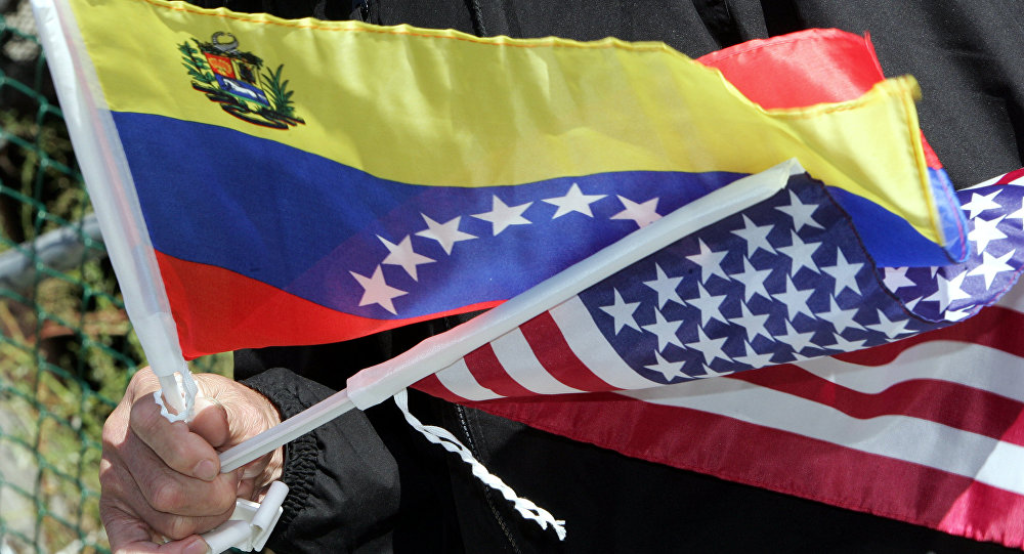
Juan Guaidó, the opposition leader and self-proclaimed “rightful” President of Venezuela, has not had a good time of it over the past several weeks. At the end of April, he called for widespread protests and uprising in the military that, he obviously hoped, would bring about the end of the regime of President Nicolas Maduro. While the street protests came and some members of the military did join the side of the rebellion, there was not sufficient support from the military and the rebellion ended up quickly fizzling out. Since then, several members of the opposition have been arrested and the street protests have largely ended, putting Guaidó back in the position of effectively openly calling for military intervention by the United States:
Venezuelan opposition leader Juan Guaidó on Saturday said he’s instructed his political envoy in Washington to immediately open relations with the U.S. military in a bid to bring more pressure on President Nicolás Maduro to resign.
The leader said he’s asked Carlos Vecchio, who the U.S. recognizes as Venezuela’s ambassador, to open “direct communications” toward possible military “coordination.”
The remarks, at the end of a rally Saturday, mark one of his strongest public pleas yet for greater U.S. involvement in the country’s fast-escalating crisis. While Guaidó has repeatedly echoed comments from the Trump administration that “all options” are on the table for removing Maduro, few in the U.S. or Venezuelan opposition view military action as likely nor has the White House indicated it’s seriously considering such a move.
But with tensions between the U.S. and Maduro running high, the saber rattling is getting louder.
On Saturday, Venezuelan Defense Minister Vladimir Padrino condemned what he said was an illegal incursion by a U.S. Coast Guard cutter into Venezuelan territorial waters. He provided no evidence to back the claim but said that the Venezuelan Navy vessels forced it to withdraw..
“I don’t know if other republics will accept actions like this in their jurisdiction, but we will not,” he said.
Army Col. Amanda Azubuike, a South Command spokeswoman, said a U.S. Coast Guard vessel was conducting a drug interdiction mission in the international waters of the Caribbean Sea. She declined to provide further comment.
In past days, Padrino also denounced what he said were attempts by the U.S. military to sow discord inside Venezuela’s barracks, inviting an angry response from U.S. Navy Adm. Craig Faller, the head of South Command, who said he “stands ready” to assist Guaidó.
“I look forward to discussing how we can support the future role of those (leaders of Venezuelan armed forces) who make the right decision, put the Venezuela people first & restore constitutional order,” Faller said.
As head of the embattled National Assembly, Guaidó launched a campaign in January to oust Maduro, gaining the support of the U.S. and more than 50 nations.
He announced Saturday a forthcoming meeting with U.S. military officials and said that new actions taken by the opposition will seek to “achieve the necessary pressure” to put an end to the Bolivarian revolution launched 20 years ago by the late socialist President Hugo Chávez.
Guaidó has said that as Venezuela’s rightful leader he reserves the right to invite foreign military actions in the same way independence hero Simon Bolivar hired 5,000 British mercenaries to liberate South America from Spain. He says any such help should be considered “cooperation,” instead of intervention, something he has accused Maduro of allowing in the form of military and intelligence support from allies Cuba and Russia.
In recent days, the government has sought to ramp up its own pressure on the opposition with the arrest of the No. 2 leader of the opposition-controlled National Assembly, Edgar Zambrano. Several other anti-Maduro lawmakers have sought refuge in the embassies of foreign nations as the country’s top court announced investigations of Zambrano and nine other members of congress.
Meanwhile, noticeably diminished crowds at opposition protests reflected a growing fear and demoralization that has permeated Guaidó’s ranks of supporters after he led a failed military uprising on April 30. In previous months, thousands of demonstrators heeded his calls to protest.
On Saturday, a modest crowd of several hundred Venezuelans gathered in the capital of Caracas.
The fact that Guaidó finds himself in this situation is entirely unsurprising. If his call for a popular and military uprising against the central government was going to succeed, it would have been apparent in the early hours and days of the campaign that he started on April 30th. When that didn’t happen even in the face of massive street protests that themselves have fizzled out, it was pretty clear how all of this was going to play out. As in the past, we saw small elements of the military defect to the opposition but none of the top leadership joined them and the groups that did defect were a relatively small portion of the entire military, which remains loyal to Nicolas Maduro. Unless and until that changes, nothing is going to change in Venezuela and Guaidó would be foolish to believe otherwise. None of that, however, is a good reason for the United States to support him with military intervention.
This isn’t the first time that Guaidó has openly called for outside military intervention in domestic Venezuelan affairs, of course. He made a similar call back in February not long after he stepped forward to claim the Venezuelan Presidency after a fraud-tainted election that resulted in the re-election of Nicolas Maduro. As I noted at that time and in several posts since then — here, here and here — such intervention on the part of the United States would be foolish to say the very least.
First of all, it’s a bad idea from the perspective of the Venezuelan opposition since it would seem to play right into Maduro’s hand and confirm his allegations that the opposition is little more than a fraud perpetrated by the United States and its allies such as Colombia. Hoping for or appearing to advocate in favor of outside military intervention also seems like an unwise move on Guaidó’s part because it has the potential to undercut the possibility of his receiving support from the one institution in Venezuela that could bring a quick end to the Maduro regime if it wanted to, the Venezuelan military. So far, the military continues to stick with the Maduro regime in no small part because he has been sure to stock the leadership with people who owe their place in power to him. Calling for, or appearing to advocate for, outside intervention by the United States or any other nation gives those leaders more incentive to stick by Maduro’s side both to ensure their own continued place in power and to avoid being cast as traitors conspiring with foreign powers to overthrow the government. Additionally, as we’ve seen in the past, Maduro has been quick to crack down on rebellious members of the military. In that context, it seems unlikely that many Generals who already owe their place in the chain of command to Maduro will stick their necks out for a man who appears to be welcoming the idea of the American military in internal Venezuelan affairs.
From the American point of view, there are two arguments against intervention:
[It would be] a significant step backward in terms of the manner in which the United States has interacted with Latin America. For the better part of the 20th Century, of course, the United States engaged in what can only be described as a policy of colonialism toward its Central and South American neighbors, overthrowing governments at will, intervening in civil wars, backing dictators over democratically elected leaders, and allowing corporations to essentially take control of entire nations, especially in the agriculture field. In other words, the United States was fully earning the title of “Ugly American” often directed against us. Over the course of several decades, and especially since the end of the Cold War, we’ve managed to move past that era into one where the United States has become more of a partner with its neighbors to the south. Intervening in the internal affairs of a Latin American nation like Venezuela risks ruining all of the work we’ve done to move past those bad old days.
Finally, American intervention against the Maduro government would be unjustified on two grounds. First of all, as of now, there is no Congressional authorization for such action. Absent that, any military action the President would take would be illegal and unconstitutional. If President Trump really wants to intervene military in Venezuela, let him make his case to Congress and let the people’s representatives have their say. This is what the Constitution requires, and it should not be ignored. Second, the simple fact of the matter is that the Maduro regime does not pose a threat to American national interests sufficient to justify military intervention, and the United States certainly cannot afford either a war in South America or the prospect of having the political future of that nation on our hands for who knows how long. In the meantime, along with much of the rest of the western world, we have recognized Juan Guaidó as the legitimate leader of the country. Our job now should be to find a way to bring an end to the current political crisis and, of course, to get the people of Venezuela the food and medical aid they are being deprived of by a regime that cares more about its hold on power than it does the suffering of the populace. Beyond that, we need to stay out of this situation
In the end, the fate of Venezuela will be decided by the Venezuelan people and the military. The United States should stay out of it.

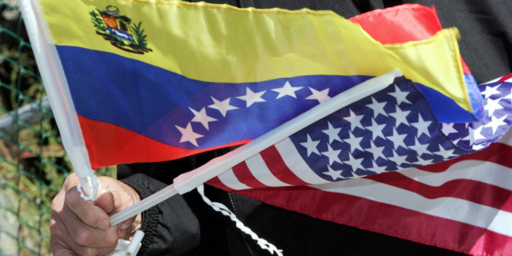
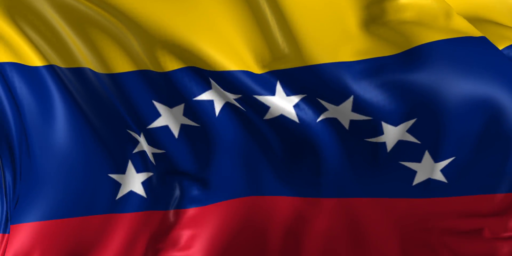
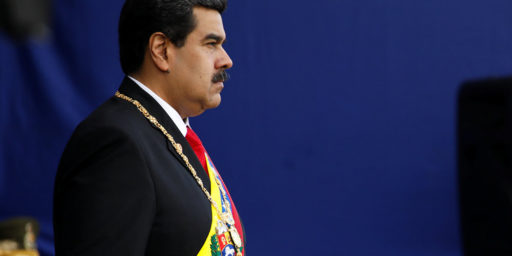
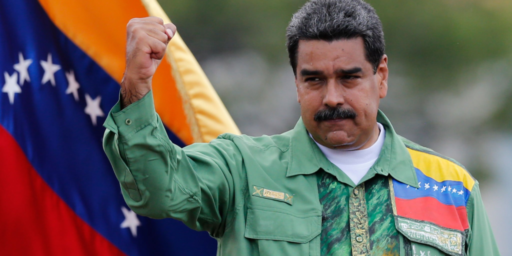
I trust that the U.S. is more intelligent than to listen to this man. Aside from confirming every stereotype about “Imperialist America” (much to the delight of both China and Russia), the blunt fact is that if Venezuela isn’t able to sort itself out there’s no evidence that adding the U.S. to the mix the situation would improve. At some point, Venezuela is going to have to deal with its own problems.
For heaven’s sake, how many years have we been in Afghanistan trying to keep the mess together?
At a rally, he said “America, if you’re listening, I hope you’re able to send 30,000 soldiers.”
Venezuela has 32 million people in an area equal to Texas + Wyoming, replete with all the best guerrilla war environments: jungle, mountains, city slums. There are a number of possible outcomes to a US intervention, but the one I’d bet on goes like this:
1) Immediate, crushing success! Yay!
2) Resistance grows.
3) The new government with US help overreacts, making many new enemies.
4) Guerrillas find sanctuary in the mountains and the rain forest, establishing camps in neighboring Colombia and Brazil.
5) Flash forward ten years and we’ve lost a couple thousand guys, spent a trillion dollars, Venezuela is in a civil war and it’s spreading into Colombia and Brazil, destabilizing both governments. But friendly forces control Caracas. Well, parts of Caracas.
The question is whether Bolton wants to go to war in Venezuela. I think he’d rather have his war in Iran. Which leads me to posit another terrible scenario: getting a regional force put together to carry out the armed intervention, with US air support.
Or maybe a Bay of Pigs Part Two, this time with US air support.
Both ideas are terrible.